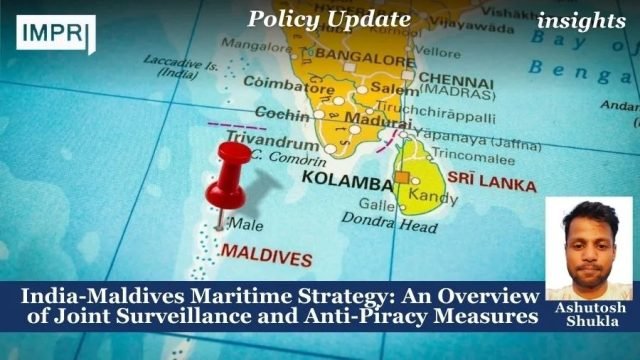Policy Update
Ashutosh Shukla
Background
The Indian Ocean Region is vital for trade, which covers more than 17% of the global area and encompasses more than 30 littoral and Island nations across 3 major continents with more than 35% of the world’s population. The region is not only geographically important but also strategically important; it holds rich resources. Coastal regions and international waters of the Indian Ocean hold more than 50% of the trade. Both strategically and economically, the Indian Ocean Region(IOR) accounted for a major amount of trade.
India and the Maldives are both key players within the IOR in terms of seaborne trade, the former a peninsula, the latter an island nation; both have large EEZ and coastal regions. Both nations have always strategically and economically realigned their defence, maritime, and economic partnership to foster their relation and collaboration within the IOR In October 2024, both nations had an agreement to elevate the ties for a comprehensive maritime security partnership, which underscores the stability of the Indian Ocean Region. Both nations have historically been involved in joint patrolling to safeguard the interests of each other and also of the Indian Ocean Region.
With maritime domain awareness, the island has been cooperative with its neighbour in terms of capacity building, anti-piracy, coastal surveillance and security. The partnership between India and Maldives extends beyond defence, India’s 400-million-dollar currency swap aiding Maldives in pandemic recovery and 900 crores rupees for island’s sanitation program and water management in 2024 at the same time India transferred patrol vessels and assault ships to Maldives National Defence Force to protect its coastal waters, India being a net-security provider in the Indian Ocean Regions protects the region against piracy and other illegal activities.
Why Robust Coastal Surveillance Is Crucial for India and the Maldives
The India Ocean Region account for 80% of the oil trade, and in the ocean, the coastal waters of both India and the Maldives guard critical shipping lanes, resources and also the livelihoods of the people from the coastal regions. For the vast coast of the Indian Ocean, the western coast of India and the coastal periphery of the Maldives, effective coastal surveillance is a necessity to safeguard these waters from both conventional and nonconventional threats such as piracy, seabound terrorism, drug trafficking, and illegal fishing.
The island nation despite having small population governs vast Exclusive Economic Zone which exceeds up to 900,000 square kilometres which is a vast maritime domain as the land mass of the Maldives is scattered in more than 1000 small island for Maldives robust and effective monitoring is essential for survival of the island and economic stability without accurate, robust and timely detection of the threat and response these activities can rampant the Maldives limited maritime resources and capabilities.
While in the Case of India, its coastline is extended over 7,500 kilometres, which not only borders with multiple nations but borders with major chokepoints such as the Strait of Malacca, the Strait of Lombok, the Sunda Strait and the Gulf of Aden, by which approximately the 80% of the seaborne oil passes within and beyond the region. To safeguard the economic, security and maritime interests of India, it can be possible only with robust coastal surveillance, and it also protects these critical sea lanes from piracy, maritime terrorism, and all kinds of illegal trafficking.
The Indian Navy, which protects coastal waters within the region, the navy have been instrumental in terms of escorting the commercial vessels not only of India but of other various nations, especially from Somali Pirates in high-risk areas. Robust coastal surveillance enables India to protect these critical sea lanes from piracy, maritime terrorism, and trafficking. For instance, the Indian Navy’s anti-piracy deployments in the Gulf of Aden have been instrumental in escorting commercial vessels safely through high-risk areas, reducing piracy incidents significantly.
The surveillance is crucial for both nations for nontraditional security threats such as climate change and, sinking of the coastal regions. While Piracy remains the unprecedented threat, especially near the chokepoints, where if the pirates take control, they can disrupt the trade of the region.
Role of Maldives and Island Nations in Coastal Surveillance in the Indian Ocean with India
Both the Maldives and India, along with other littorals in the IOR such as Madagascar, Mauritius, Timor Leste, and Seychelles, play a significant role. The role of island nations is significant due to their vast maritime jurisdiction. These nations are custodians of the vital shipping lanes, which support the regional and global trade along with India and the Maldives.
In the case of the Maldives, limited human, financial and even to some extent technological constraints hinder the monitoring and effectively securing the expansive EEZ, so the alliance with a bigger entity becomes more crucial, where India, as a first responder and net security provider, plays a crucial role to enhance the coastal surveillance capabilities. India’s with its advanced maritime surveillance and advanced radar system, joint cooperation in terms of exercises such as Ekatha, Dosti and with capacity building programs, shared interest and maritime domain awareness within the region, helps bridge the gaps of anti-piracy and surveillance.
India, along with the India Ocean Rim Association countries and the Colombo Security Conclave, facilitated the intelligence sharing, joint patrols and anti-piracy and collaborative response to transregional threats. Maldives’ efforts in terms of Coastal Surveillance not only extend to security but also to hydrographic surveying and disaster response.
Cooperation beyond Land Borders and Anti-Piracy Measures
Both India and the Maldives, throughout time, have evolved their strategic and security relations. Their relation is based on maritime security and maritime domain awareness. India and the Maldives have collaborated with each other in terms of technology defence procurement from India to the Maldives, which enabled improved and accurate tracking of all kinds of maritime movements, bolstering real-time situational awareness. India has also provided the Maldives with an advanced radar system and training to the military personnel, and also gifted aircraft, helicopters and maritime patrol planes.
India also supported Maldives in modernising maritime infrastructure training providence to the Maldives National Defence Force at the same time India with Ekatha Harbour Project at Uthuru Thila Falhu not only near coastal waters but both have been cooperating beyond the coastal waters, frequent join exercise and joint patrol of Indian Navy with Maldives reshaped the coordination and defence readiness, all these efforts are consolidated through various forums such as Colombo Security Conclave, Indian Ocean Rim Association, Indian Ocean Naval Symposium facilitating. In terms of intelligence sharing and maritime governance, India’s Information Fusion Centre and the white shipping agreements, which enabled maritime information exchange crucial for both defence and offence coordination within the IOR.
The piracy within the IOR is one of the most concerning challenges to the coastal security of both nations, which directly affects the trade, regional stability, security of the region and also the national security. India has a multifaceted and multi security anti-piracy strategy which includes naval deployment, help from the aircraft, legal reforms with international collaboration and also India complements the maritime security and surveillance to combat piracy together within the region.
Both Indian and Maldivian naval vessels regularly patrol in the coastal areas and in international waters in all the high-risk areas, especially high-risk piracy zones. This patrolling goes beyond till Gulf of Aden. The participation of India in many initiatives, such as the Regional Cooperation Agreement on Combating the Piracy and Armed Robbery Against Ships in Asia (ReCAAP), and the Contact Group on the Piracy off the Coast of Somalia, which majorly deals with the commitment of India and the Maldives to all these multilateral efforts.
One more important thing, which is the legal framework for maritime security and to combat piracy, has been strengthened in terms of effective prosecution of the cases related to piracy, which will also deter future acts, as these pirates often threaten smaller fishing communities, stop the economic activities and trading vessels. To combat piracy at the high seas, the efforts of both nations also target sea robbery, which generally happens closer to the coastal waters.
The annual Ekatha exercise enhances which improves operational efficiency and also the tactical readiness of both nations’ navies. Cooperation of both nations with these efforts, combined with the modern surveillance technological systems, contributes to the reduction of piracy threats, and at the same time, it supports safe navigation and the uninterrupted flow of maritime trade.
Future of the Cooperation and Challenges
India-Maldives cooperation indicates a deeper and mutual integration with the motto of enhanced regional maritime security collaboration and cooperation. Both nations have planned to expand the technological infrastructure while focusing on future trade. India and the Maldives. Further plans encompass in terms of radar deployments and monitoring, satellite surveillance integration and also plan to use unmanned aerial vehicles for the betterment of the trade and extended surveillance capabilities. Future initiatives such as a joint training program, naval cooperation for better crisis responsiveness.
This will allow both nations to strengthen economic and defence ties, and also could lead to trade agreements with respect to the coastal areas and bilateral agreements and investments. Both the nation along traditional security focus on nontraditional security as well, such as climate change and sustainable development in coastal areas, and sustainable use of maritime resources. The partnership between India and the Maldives involves the engagement of other various factors, such as Australia, Japan, and the U.S., to diversify the framework. These kind of integrations holds promise for the future in terms of better regional governance and robust maritime defence mechanisms.
Both nations, despite cooperation, face complex challenges, one is political sensitivity. The balancing act between both nations in terms of maintaining strategic autonomy and benefiting from each other. In the case of the Maldives, the balancing act is a challenge and also the capacity constrain, limited resources, delays in their defence personnel training to operate the aircraft and also the skilled labour.
The Maldives heavily relied on Indian support. The expanding Chinese influence in the IOR through the infrastructure development and capacity building with the Maldives and also other small island nations indicates the strategic maritime competition. Apart from the traditional challenges, there are operational challenges as well, which often include the aspects of technological integration and also ensure data integration. There are environmental challenges as well, which add urgency to the security disaster.
Way Ahead
Maritime security and regional stability is core component of long term goals of both respective nations, to overcome the challenges within the Indian Ocean Region India and Maldives need to continue their cooperation transparent and inclusive dialogue at the same time increasing the pace of use of resources in a sustainable way through various mechanism such as robust infrastructure development and training to the Maldives National Defence Forces which will reduce the dependency of Maldives over India.
The joint investments in the sustainable infrastructure and cutting-edge technology vis-à-vis the maritime domain, at the same time focusing more on advanced radar systems, satellites, use of AI and AI-driven analysis and also unmanned systems, will not only enhance coastal surveillance but also help in combating piracy. Both nations need to strengthen the multilateral engagement with major security partners, as well as the legal reforms for crimes based on maritime and prosecution based on these crimes will act as a deterrent.
The environmental and climate concerns need to be resolved as they are indirectly linked to the coastal security of both nations. Major emphasis should be on the economic prosperity of the coastal region with a shared maritime vision and action plan.
Conclusion
The Partnership of India and Maldives in coastal surveillance and also in the anti-piracy underpins the major blueprint regarding security measures in the Indian Ocean Region, which is necessary for Trade and stability of the Indian Ocean Region. The ties are rooted in their cultural history with mutual interest and understanding towards the region and the needs of each other.
With the combined efforts which involve advanced technology, threat preparedness and responsiveness, mutual capacity building and cooperation in terms of legal reforms and with multilateral organisations. The future-oriented strategies are necessary for modernising the defence forces to combat coastal threats and piracy, and a robust framework and joint working will lead both nations to prosperity, as the Indian Ocean would benefit the coastal trade with fewer threats if the framework and plans are implemented in a better way.
References
About Author: Ashutosh Shukla is a Research Intern at IMPRI, with a Master’s in International Relations and Strategic Studies from the University of Mumbai. His research interests include foreign policy, diplomacy, and International Relations.
Acknowledgement: The author extends his sincere gratitude to the IMPRI team, Ms. Aasthaba Jadeja and Bhaktiba Jadeja for their invaluable guidance throughout the process.
Disclaimer: All views expressed in the article belong solely to the author and not necessarily to the organisation.
Read More at IMPRI:
India – Russia Revival of Historical Artistic Exchanges
The National Food Security & Nutrition Mission (NFSM): India’s Agricultural Transformation



















